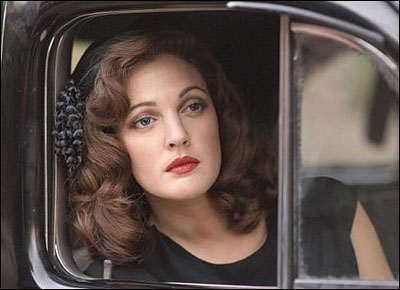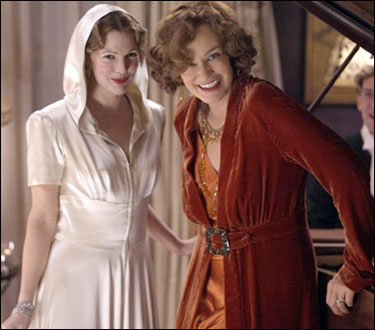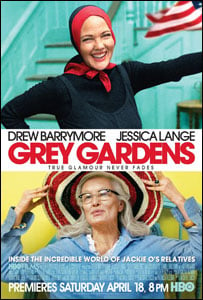 Perhaps the other utterly fascinating documentary about eccentricity, besides Farjad Nabi's Nobody Believes The Professor, -- about Orpheus Augustus Marcks, a.k.a. Professor Sahib a Lahori poet, actor, philosopher and athlete, last seen in Ali Azmat's video 'Naa Re Naa' --is Albert and David Maysles's Grey Gardens. (1976) Perhaps the other utterly fascinating documentary about eccentricity, besides Farjad Nabi's Nobody Believes The Professor, -- about Orpheus Augustus Marcks, a.k.a. Professor Sahib a Lahori poet, actor, philosopher and athlete, last seen in Ali Azmat's video 'Naa Re Naa' --is Albert and David Maysles's Grey Gardens. (1976)
The subjects of Grey Gardens were Big and Little Edie Beale--high-society dropouts, mother and daughter, reclusive cousins of Jackie Kennedy--living together, gothic style in a 28-room mansion (the mansion is named Grey Gardens) among hundreds of cats and raccoons. Not a lot happens in Grey Gardens, Little Edie threatens, theatrically and repeatedly, to leave her mother and return to New York, while Big Edie shows contentment and reminisces of a remorse-free past to compensate for her daughter's flashy misery. But what you realize slowly is that the Beales -- like another famous recluse, Howard Hughes-- are virtually cutoff from the outside world, who spend each day locked in the same nearly identical loop of confrontation and half-hearted reconciliation, and where with the Maysles we find, a horrid yet strangely beautiful world of loss and regret and a slow lingering feeling of being out of step with a suppressive, airless society.
Thirty-three years later, television revisits the Beale saga. The HBO film Grey Gardens starts in the past. Its 1936 and Big Edie (Jessica Lange) and her then-husband, Phelan Beale (Ken Howard), are preparing to introduce their daughter Little Edie (Drew Barrymore) at a glamorous debutante party. Yet Little Edie would rather go on the stage than find a husband, and as the party music plays on she flees into the night. At this point and into the 1950s Little Edie waits for her life to begin in New York. Big Edie may fancy herself a singer, too, but she and Daddy don't support their daughter's aspirations.
 When her father began running out of money, the toll made worse when he had a new wife to support along with his first one and the children, Little Edie refuses to support herself by finding a regular job because she always remains the "aspiring actress." When a thrilling romance with a married man blows up in her face, she heads for Grey Gardens. There she joins a mother already in mental and financial decline, because she thinks marriage will trap her -- only to be trapped instead by her mother for most of her adult life. The film constantly intercuts from the Maysles filming the Beales in the house circa 1975 and the past. When her father began running out of money, the toll made worse when he had a new wife to support along with his first one and the children, Little Edie refuses to support herself by finding a regular job because she always remains the "aspiring actress." When a thrilling romance with a married man blows up in her face, she heads for Grey Gardens. There she joins a mother already in mental and financial decline, because she thinks marriage will trap her -- only to be trapped instead by her mother for most of her adult life. The film constantly intercuts from the Maysles filming the Beales in the house circa 1975 and the past.
The imagery of Grey Gardens is cleverly split into two. From 1936, till the 1950s, the mansion and the surroundings are bathed in hues of golden light and set in bright colors; the compositions are airy, full of life and things yet to come. But as Big Beale's slow mental disintegration starts to set in; the rooms of their mansion and areas of their lives start to close off, one at a time, the palate becomes darker, blacks and blues dominate and the compositions become tighter, leaving the edges of the screen to the forages of bitter memories, the ruined house crawling with cats and fleas, the paper bird in the rusty gilded cage.
 What's truly astonishing about Grey Gardens are the performances by Jessica Lange and Drew Barrymore. It's all tit for tat acting, one constantly raising the bar for the other, scene by scene, line by line. Jessica Lange, graceful and stubborn in the flashbacks, old with gristly white hair, thick-lensed glasses and crooked teeth and still extremely stubborn till the end of her life. Lange brings extraordinary power to Big Edie, bringing forth an ugliness that we feel in some people but can't really describe, showing that her stubbornness was fueled always by fear. Whether you like Drew Barrymore, you would have never guessed that she was capable of pulling of a role like this. With a face uglied up behind prosthetics and a bald head that she tries to hide with a variety of sweaters, blouses and towels, Barrymore eerily replicates not only Little Edie's very odd manner of speaking but also her confusing detachment from the world. What's truly astonishing about Grey Gardens are the performances by Jessica Lange and Drew Barrymore. It's all tit for tat acting, one constantly raising the bar for the other, scene by scene, line by line. Jessica Lange, graceful and stubborn in the flashbacks, old with gristly white hair, thick-lensed glasses and crooked teeth and still extremely stubborn till the end of her life. Lange brings extraordinary power to Big Edie, bringing forth an ugliness that we feel in some people but can't really describe, showing that her stubbornness was fueled always by fear. Whether you like Drew Barrymore, you would have never guessed that she was capable of pulling of a role like this. With a face uglied up behind prosthetics and a bald head that she tries to hide with a variety of sweaters, blouses and towels, Barrymore eerily replicates not only Little Edie's very odd manner of speaking but also her confusing detachment from the world.
Watching Grey Gardens, like watching other films about untreated mental illness or poverty, might feel like watching a freak show or like an act of voyeurism but what it most importantly triggers is the feeling that how some individuals live exactly as they want to and how we as the society look upon them so differently.
Grey Gardens won the Golden Globe for Best Movie Made For Television, Drew Barrymore won the Golden Globe for Best Performance By An Actress in a Movie Made For Television and Jessica Lange won an Emmy for her performance.
Ali Sultan
*YUCK
**WHATEVER
***GOOD
****SUPER
*****AWESOME |

